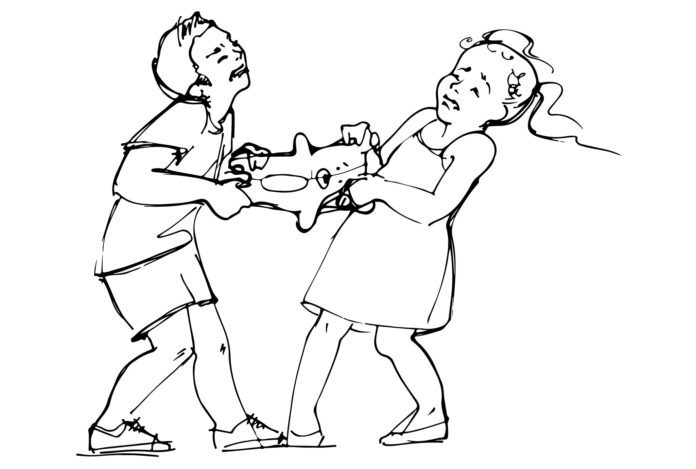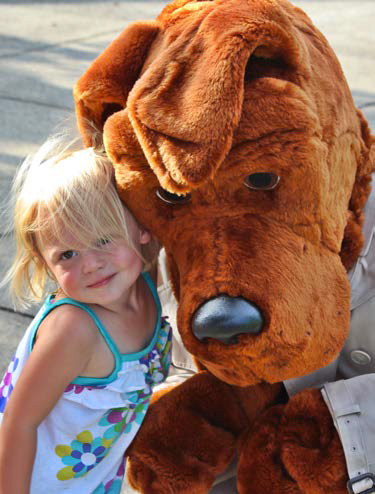Top Tips to Respond to Sibling Conflict
Sibling conflict (and how to respond) can be one of the more stressful dynamics for parents to process and manage. Sibling conflict can come in many different flavors, and while the majority of these squabbles usually fall within the umbrella of ‘developmentally typical behavior,’ the impact on the family can still be significant. Although a certain degree of conflict amongst humans living together may be inevitable, fighting does not have to be. The good news is that there are ways parents can respond to sibling conflict that will help their kids build important relationship skills. This will not only help home feel more peaceful, but can set kids up to skillfully navigate conflict in their future relationships.
Here are a few of my favorite tips and tricks for parents when responding to sibling conflict:
1. Facilitate > Fix
Parents often wonder if they should step in to help their kids solve conflict, or take a more hands-off approach and let siblings sort things out on their own? I usually recommend taking a middle-path approach, one that allows parents to respond to conflict as a teachable moment, but still leaves kids with a degree of autonomy and control. Psychologist Pamela Varady, PsyD (2022) also recommends parents take a soft approach to responding to sibling conflict and suggests using the acronym T.A.P. as a guide. ‘T’ stands for ‘translate.’ Instead of saying which kiddo is right vs. wrong when conflict emerges, start by ‘translating,’ or describing what’s happening. (Example: “you’re mad your brother took your lego,” “you think you should have the lego because it’s the last one.) ‘A’ stands for ‘attune,’ so accurately attuning to the feelings of both children. And ‘P’ stands for helping kids ‘problem solve’ the situation (Varady, 2022).
2. Cultivate Empathy
A usual consequence for fighting, especially for behaviors such as aggression, is for kids to go to their room. While clear household rules, including rewards and consequences, can be very appropriate, and a certain amount of space to cool down is often necessary, kids often don’t build many skills to handle frustrating situations differently when they’re sitting alone in their room. When more significant behaviors such as aggression occur, I recommend parents take steps to help their child build empathy for their sibling. For example, after the dust has settled, parents can help their kiddo go ‘check on’ their sibling and make sure they’re okay. Maybe they bring their sibling an ice pack, a band-aide, or a glass of water.
3. Normalize Relational Repair
A mantra from one of the most esteemed play therapists, Gary Landreth, is ‘sometimes the most important thing isn’t what you did, but what you do after you did what you’ve done (Landreth, 2002).’ Normalizing relational repair after moments of conflict is a great goal for a family and one that can be continually put into practice. Again, although a certain degree of conflict may be inevitable, it is how we handle conflict that can make or break a relationship. Parents can model healthy relational repair skills after conflictual interactions with their children, such as when adults might lose their cool and respond out of frustration (which is bound to happen at some point). This affirms that while conflict may be a part of life, there are things we can do to maintain healthy relationships.
4. Reward the Positive
Remembering that kids respond better to reward than punishment can be helpful. And finding creative ways to reward positive behavior and interactions between siblings can be fun and worth your while. My favorite method for this comes from Dr. Lee, a clinical psychologist at the Child Mind Institute, called The Tootle Jar (Martinelli, 2022). Martinelli (2022) reports, “Tootling, as Dr. Lee describes, is calling someone out for positive behavior. So, for example, encourage your kids to come and tell you when their sibling shares a toy or demonstrates kindness, then make a big deal out of the positive actions of both children. Depending on your family culture, you may want to start a penny jar that gets them pizza night when it’s full, or have some other means of documenting all the good deeds.”
References:
Landreth, G. L. (2002). Play therapy: The art of the relationship. New York: Brunner-Routledge.
Martinelli, K. (2022, April 20). When siblings won’t stop fighting. childmind.org/article/when-siblings-wont-stop-fighting/
Varady, P. (2022, April 15). Should I stay out of it when my kids fight? Kids in the house [Video]. www.kidsinthehouse.com/preschooler/friends-and-siblings/sibling-rivalry/should-i-stay-out-it-when-my-kids-fight



















